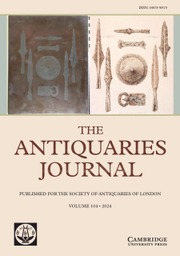Article contents
‘Banks is the villain!’? Sir Joseph Banks and the governance of the Society of Antiquaries
Published online by Cambridge University Press: 21 April 2009
Abstract
The name of Sir Joseph Banks (1743–1820) is well known in scientific and exploration circles – he is undeservedly much less well known as an antiquary. This study considers his roles in relation to the premier antiquarian society of the time, the Society of Antiquaries of London. Using the Society’s records, Sir Joseph Banks is considered as an ordinary Fellow, as a member of Council, as an auditor of the finances and as a scrutator at elections. The relations between the Royal and Antiquarian Societies on first moving into Somerset House and the contemporary question of whether they might have merged is also examined. Joseph Banks’s role in the circumstances of the three contested presidential elections of 1785, 1799 and 1812 is especially considered, and these are seen not just to represent internal squabbling amongst the Fellows, but to reflect the wider social and political strains of the time. In producing the narrative of these elections, significant past mistakes are corrected. Lastly the relationship between George iii and the Society of Antiquaries is touched upon.
Résumé
Le nom de Sir Joseph Banks (1743–1820) est bien connu dans le milieu scientifique et celui des explorateurs – mas il mérite d’être bien mieux connu en tant qu’antiquaire. Cette étude prend en considération ses rôles par rapport à la plus importante société d’antiquaires de l’époque, la ‘Society of Antiquaries of London’ [Société des Antiquaires de Londres]. Par le biais des actes de la Société, Sir Joseph Banks est pris en considération en tant que membre ordinaire, en tant que membre du conseil, en tant que vérificateur de ses comptes et en tant que scrutateur lors de ses élections. Les rapports entre la ‘Royal Society’ et la ‘Society of Antiquaries’ lors de leur première installation à Somerset House et la question contemporaine de leur fusion potentielle sont également examinés. Le rôle de Joseph Banks dans les événements des trois élections présidentielles contestées en 1785, 1799 et 1812 est tout particulièrement examiné, et on peut constater que ces élections représentent non seulement les querelles internes parmi les membres mais reflètent également les tensions sociales et politiques plus générales de l’époque. La production du récit de ces élections permet de corriger d’importantes erreurs commises auparavant. En dernier lieu est abordé le sujet des rapports entre Georges III et la ‘Society of Antiquaries’.
Zusammenfassung
Der Name Sir Joseph Banks (1743–1820) ist in Wissenschaftler- und Erkunderkreisen ein Begriff – in den Kreisen der Altertumsforscher ist er unverdientermassen viel weniger bekannt. Diese Studie beschäftigt sich mit seiner Rolle, die er für die ranghöchste Gesellschaft von Altertumsforschern, der ‘Society of Antiquaries of London’ (dt.: Londoner Gesellschaft für Altertumsforschung) gespielt hat. Mit Hilfe von Quellen der Gesellschaft wird er in verschiedenen Rollen bedacht, als ein ordentliches Mitglied, ein Kollegienmitglied, als Finanzprüfer und als Wahlprüfer. Die Beziehung zwischen der ‘Royal Society’ (dt. Königliche Gesellschaft – eine Akademie der Wissenschaften) und Society of Antiquaries wird unter die Lupe genommen, insbesondere deren Umzug ins Somerset House und die aktuelle Frage ob sie sich hätten zusammengeschließen können. Die Rolle von Joseph Banks in den drei Präsidentschaftswahlen derJahre 1785, 1799 und 1812 wird besonders behandelt, da sie nicht nur von internen Gezänk under den Mitgliedern geprägt waren, sondern auch weitere soziale und politische Spannungen reflektieren. Durch die Schilderung dieser Wahlen werden bedeutende Fehler aus dieser Zeit korrigiert. Zuletzt wird die Beziehung zwischen König George III und der Society of Antiquaries kurz angesprochen.
- Type
- Original Article
- Information
- Copyright
- Copyright © The Society of Antiquaries of London 2009
References
BIBLIOGRAPHY
- 6
- Cited by


